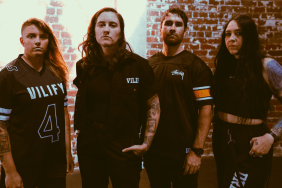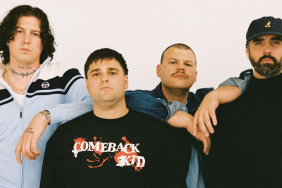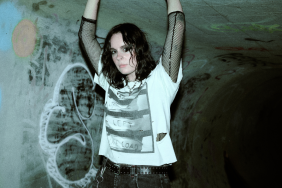It’s hard to define Shabazz Palaces and their caper. Indie label sub-pop considers them their first ever hip hop signing, but tagging them as ‘hip hop artists’ doesn’t do justice to the sound they’re pioneering. Like an intricate patchwork Persian rug, they weave Middle Eastern come North African beats with Bedouin prophecy – all embellished with coded lyrics to describe a future world free from oppression.
Although frustratingly cryptic at times, their cause is noble and they’re bringing the ‘enlightenment’ to Australia for Sydney Festival in January.
Music Feeds sat down with Ishmael (one half of the duo) for an adventure into the universe(s) that his alter ego Palaceer Lazaro traverses through music.
MF: Since releasing Black Up you’ve talked a lot about the very ‘organic’ process you guys adopt to make your music. The word organic doesn’t give us much insight though; can you elaborate?
I: The process is really not something that is very interesting looking at it in hindsight. We rely on instinct. We have lives, so it’s not like you know we are recording every night, but the equipment is close by so whatever happens we try to capture and whatever is captured we try to believe in it. Of course there is some tweaking and stuff that goes on, but we try to keep that as minimum as possible so that we can capture a feeling from a certain time – something that was instinctive and then we just kinda piece things together you know.
MF: You kind of defy genres that are perhaps more familiar to punters or easy to describe based on similar sounds from other artists working in similar styles. How would you best describe your sound?
I: I wouldn’t describe it – the thing about listening to something is that the feeling you get from it is indescribable. That’s the point of listening to music for me. I’ve never related to descriptions of music especially when the music is so totally derivative of whatever you’re mentioning to describe it, it makes it uninteresting to me in the first place. The music we make is an adventure through our instinct and we like to share that so there are no expectations or no demands, and that makes for a free experience when you’re listening to it, and maybe you might like it.
MF: Lyrically Black Up is quite cryptic. It sounds like you’re speaking in code most of the time and it feels like you want us, the listener, to work really hard to decipher a particular message every time. If you’ve got something so deep and profound to say already, why do you code the message?
I: No man, we don’t consciously do that. It’s a result of instinct. It’s just the way that it goes – the way that it happens. We don’t try to predetermine it or try to come ahead of time to figure out what it’s supposed to be. Like I said, when we arrive at a place we understand ‘oh yeah that’s what it’s supposed to be’ – it’s happening to us. We’re not making it happen. Of course I can’t go back and say what the code is and why we do it, but we’re not doing it for the publicity of being able to do it – you know what I’m saying – it’s just really a code in that sense to be understood by everyone. It just takes some time and it’s not obvious – meanings change depending on who they’re meaning something to … that’s kinda the point of what I’m saying. The music happens to us. We don’t think the music is supposed to do ‘this’ and has to tell these certain kinda codes. We’re not doing it for commercial purposes. It’s not about that. We’re not doing it in the hopes that people will pay attention to us and the clothes we’re wearing or our personalities. It’s just different. We know that the music is a gift and we appreciate it. Not to say anything is wrong with doing it the other way – it’s just not us.
MF: On Black Up at the end of ‘An echo from the hosts that profess infinitum,’ there’s the lyric “Certain things need not be asked.” What are you referring to here?
I: Are you seriously asking me that …?
MF: Yes I am. You gotta consider that your fans want to understand you and where you’re coming from …
I: Well what you’re asking right now does not need to be asked. Music is not a vehicle to bring attention to ourselves or attention to what we do – that’s not how it is. The certain things that need not be asked are the questions that are about what’s going on behind the curtain. The curtain is only something that is perceived because there is a commercial world. Forget about the commerce of it and just listen to the music – everything is already in it. That’s the only place it is. That’s how we see it.
MF: There’s a sense of a yearning or desire for freedom when you listen to the album too. What does freedom mean to you? What kind of freedom are you searching for?
I: It’s not a desire for freedom. It’s an exercise of freedom. We are free. Regardless of whatever has been set up against us – it’s an exercise of freedom not a hope for it. We’re just saying it like we see it, so it’s visible. We’re just saying – do it – we only learn things from example by doing not just talking about it. Talking abut freedom in a real literal or linear sense isn’t the way we really feel helps anything, so you just gotta do it you know – be free.
MF: That sounds very spiritual and enlightened. Do you live your life the same way that you make your music – adopting this ‘free spirit’ philosophy ? I’m sure most people would love to live like that but we’re not all hip hop legends and we gotta work to make a living, so I guess that’s where reality kicks in for most people …
I: It’s only separate because oppressors came up with a ‘work week’ and taxes and separation of one work part of life and then one other part of life. It’s only to get people to churn out product for a machine, but once you learn and realize that’s not true – you realize there are other ways to live and that’s just something that we know, so we do it. It’s pretty wholesale, readily available information. It’s just that conditioning is deep – it’s a very profound level of influence that we are all susceptible to that we all live under it in one way or another.
MF: Palaceer Lazaro is your persona – is this kind of an alter ego? I’m wondering that if everything you do is about being real and true to the music that comes through you, why do you create characters to convey the message with?
I: It’s not a creation. They’re not characters. It’s something that you feel about yourself. You know even before you are born you have a name – that’s somewhat ridiculous in a way. I have the ultimate respect for my name and I love it, but also over the years I have felt like other names. I think keeping one name all your life seems somewhat oppressive to me so I just roll with how I feel at certain times you know. I have a lot of names – all kinds of names – that’s just one of them.
MF: Can you give me some examples of the other names you feel represent who you are?
I: No. I can’t do that. They’re just names that represent my other worlds and different realms that I exist in and that don’t have nothing to do with this place.
MF: You were releasing stuff independently before you signed to sub-pop. What kind of influence have they had on you guys?
I: They influenced us with comfort. In the beginning, they let us know that there was something strong that was going on. They reinforce and flourish the art that we have made and they let us know that. They weren’t sticking their fingers in any aspect of the production of the music, but if we needed something or wanted something, they were very willing to share their ideas in making it happen. They were results oriented so we always felt strength and excitement from them.
MF: It’s the first ‘hip hop’ release on sub-pop; what drew you to the label in the first place?
I: This is the thing. Hip hop, drum n bass, house – these are just names – even R n B or grunge – music is music. We always forget that these are types of music – they’re not really real. That’s why there can be jazz samples in hip hop and somebody can do a death metal song over some bluegrass. It’s all music man. They’re just a music label – we make music and they liked it. They dug it and what I liked about them was that their artists were always good. They seemed satisfied and happy. The people at sub-pop are good and they all care about their jobs and it’s a pretty amazing environment they’ve created.
MF: In another lifetime in the 90s you were part of Digable Planets. Is that all done and dusted or will projects like that make a resurgence now with the success of Shabazz Palaces?
I: No. I’ve moved on.
MF: What can we expect from the live show you’re going to do at Sydney Festival in January?
I: A lot of energy and spontaneity. A lot of dynamics. The album is a point of departure and the show is something very in the moment. We are happy to be coming down there and excited, and when we get there that energy is going to come out in the performance.
MF: What does the future look like for Shabazz Palaces?
I: Well I got a lot of ideas for music that I’ve been working on that I’m going to finish and put out too. Basically just more music, more touring and just videos, and just all kinds of shit just related to the music – just keeping it going. You know we are lucky that we got a space to execute the idea and then it comes out, so that’s what we’re going to keep doing.












